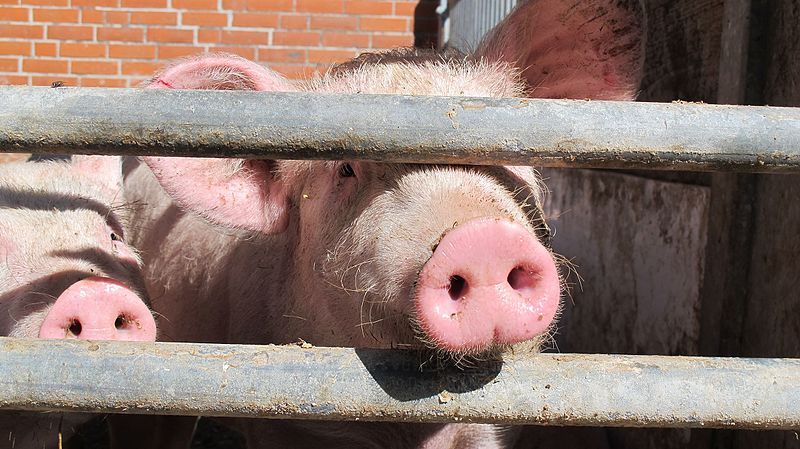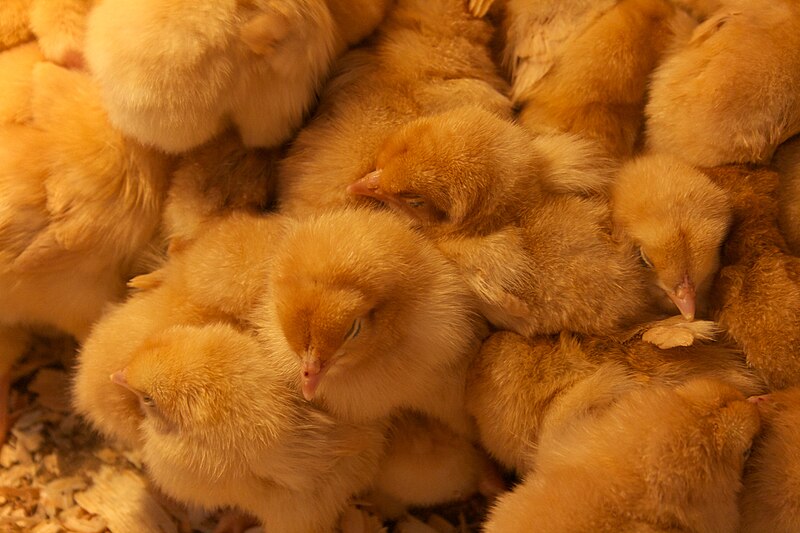Is the future vegan?

A joint piece by Navan and Samad.
For 93% of UK citizens, veganism is not a part of their day-to-day lives. But for a growing number of the population and many recent movements and campaigns, such as ‘Go Vegan World’ and ‘The Vegan Society’, there is huge concern at how meat-eating is inhumane and blatantly cruel to animals lower down the food chain.
As more and more research and evidence has come out on the sensitivity and intelligence of farm animals, as well as the exposed environmental costs of animal agriculture, veganism is now mainstream.
What if, one day, veganism was a must; consumable animal products were strictly prohibited?
According to AnimalClockUk, approximately six billion helpless animals were slaughtered for food in 2020, in ways such as gun firing and electric currents, with the sole aim being for their body parts to end up on our plates.
A large proportion of these creatures also lived their short lives in poor conditions; in both physical and emotional pain. The lives and deaths of these animals is kept deliberately far from the eyes of the consumer.
There is a federal law known as ‘the Humane Slaughter Act’ in America, and similar laws in the UK under the ‘Welfare of Animals at the Time of Killing’ legislation (there is an exception given to animals slaughtered under religious rites), which is designed to reduce the distress and suffering of livestock during slaughter. This law states that animals must be given a sedative in order for them to not feel any pain as they are being slaughtered.
Psychological studies show pigs are intelligent, sentient beings.
This involves electric shock treatments, gas, cattle prods, and a bullet to the temple so that they are left insensitive to injury before they’re taken apart. These practises are distressing, especially after the process of transporting animals to the slaughterhouse.
There are also many environmental benefits that come with minimising animal slaughter. With industrial farming now a regular occurrence, animal agriculture contributes to at least 14% of human-made greenhouse gases. Specifically, the livestock sector generates 37 percent of human-caused methane emissions. In addition to these emissions, some cattle farming supports and relies on deforestation to create grazing land, where the worldwide demand for beef has made the clearing of rainforests to raise cattle profitable. Recent documentaries have labelled the main culprit of Amazon deforestation as being both cattle ranching, and the production of soybean, for the animals’ consumption.
The documentary Cowspiracy caused quite a stir by investigating the impact of cattle farming on the environment.
But meat is not only a source of nutrition, it has become part of communal celebrations and rich symbolism; could you imagine Christmas without turkey? Turkeys have appeared at Christmas since the sixteenth century. Or the biggest fast food chains without chicken or beef? Chicken is quite literally in KFC’s name. There is an argument that certain meats define festive and religious occasions, and some have a sense that meat should be part of the human diet as humans are of superior emotional intelligence to livestock.
But to take Christmas as an example, the lives of the animals that are slaughtered for the festival don’t tend to feature on the festive supermarket adverts. Artificial breeding, insemination, overcrowded conditions and the use of growth hormones are an issue across a great deal of livestock farming.
The ethics of veganism are less obvious than that of vegetarianism. But consuming animal-products brings to light its own issues. In the dairy industry, where the female of the species is necessary for producing milk, and the males (or bulls) are not, many are shot and disposed of- it is often cheaper than raising them for beef or veal.
Similarly, male chicks are immediately culled, as they are neither appropriate for egg laying or being raised for meat. This practise can’t be avoided by the final egg product being organic or free-range.
Many are quick to brand veganism as an expensive and difficult lifestyle to maintain. But what with the huge selection of meat alternatives on the market, there is no longer such a need to start from scratch, and it is becoming all the more affordable.
A Richmond Sausages comparison. These are based on prices in Sainsbury’s stores as of 15/01/2020.
The prices of 12 Pork Sausages and eight meat-free sausages are the same. Eight vegan sausages here are on offer with 30p off, meaning they would cost £2.25. This is actually good pricing. Most vegan sausages are priced at £2. This is the frozen thick meat free sausages so, this could be to do with it being frozen or chilled (chilled being more expensive). But, the prices are so similar that there is very little difference between vegan and pork Sausages.
Other vegan ‘staple’ foods such as pulses, rice, curries and vegetables make for cheap shopping, the lifestyle only becomes expensive on looking for more complex recreations of non-vegan foods in shops. Veganism is certainly affordable, depending on what level of ‘luxury’ you are aiming for, in the same way as an omnivorous diet.
An interview with a vegan, Miss Parsons
Why did you become vegan?
‘The reason I became a vegan is not glamorous and it certainly wasn’t a grandiose, politically charged statement. In fact, it was merely the easiest thing to do at the time. I had been vegetarian for a few years, and then my family became vegans for health reasons and therefore it simply made sense.
However, since becoming vegan, I have become increasingly aware and invested in the repercussions eating meat has on our society. Whilst I undoubtedly abhor animal cruelty and the slaughter of animals, this was not and is not a guiding motive in my decision to remain a vegan, instead it is the hope that I am making a difference to keep our world as we know it, to slow climate change and to allow future generations to enjoy the world as we have.’

Interest in veganism is surging. Concern around the environment is believed to be behind the trend.
Are your eating choices expensive and/or time-consuming to implement?
‘I think in comparison to meat they are cheap, on a daily basis that is i.e. if we made a curry, a vegan curry is much cheaper than the meat alternative. However, the ‘luxuries’ are more expensive, such as a birthday cake! In regard to time consuming, I think it does take more effort if you want to have a variety of meals and you are more likely to cook from scratch as a vegan – the vegan ready-made meals are not so enjoyable, so we tend to steer clear of those. This is changing though and changing rapidly – Richmond’s vegan sausages are absolutely delicious! I definitely recommend it!’
Do you have any regrets after turning vegan?
‘Oh, tough question, no I don’t think so. Although I probably wish my last meat-meal had been something special – I don’t even remember what it was!’
What do you think is the largest benefit of turning vegan?
‘For me it is the environmental impact, I think having been vegetarian before I didn’t notice much impact health wise, but I would like to think that I am making, however small, an impact on the environment and that remains my incentive. For me it is about sustainability – therefore if I lived by the sea and fishing was far more sustainable than importing a banana, I would eat the fish. Likewise, if I had my own chickens and I knew they had a ‘happy’ life – I would eat eggs (I would never eat the chicken though!)’
Do you ever think that there will be a time where everyone is vegan?
‘Tough question. I think it will become increasingly commonplace, and the notion that every meal should contain meat/fish will hopefully soon become outdated. But no I don’t think there will be a time when everyone will be vegan as meat is such a huge part of the idea we have of ourselves as humans (top of the food chain and all that!) although obtaining meat may not be done in the same manner i.e. meat is beginning to be grown in labs as a more ethical alternative. I hope that by the time you are an adult the average fridge will have very different contents!’
A final quote:
‘Often society considers veganism to define a person, that those who practice veganism are militant believers who abhor the sight and smell of meat and the concept of innocent animals being slaughtered for human consumption. But whilst society is making leaps and bounds on the food front, it is the other animal products seemingly crucial in our day to day lives that pose a threat. Makeup, medicine, clothing and a multitude of other industries exploit animal welfare to make products that can be made with alternative synthetic materials. I fully accept those who choose to eat meat and I think nothing of their decision, but the need to have lipstick that was tried and tested on an animal, that potentially lead to its death, is something I cannot accept, and I hope society changes its ways soon.
Being a vegan is no longer an extreme; slowly but surely veganism is becoming the new normal. The world of veganism is developing rapidly, you only need to look at the plant-based sections in the supermarket, which were pretty much non-existent a few years ago, to see its progression. ’
Feature image via Wikimedia commons © author: Javier Lastras
Pigs image also via Wiki commons
Dairy cows on pasture via Wikicommons © author, Martin Abbeglen
Chicks image via Wiki commons, author: Brad Smalley
Interest in veganism graph via the Economist, source- Google Trends


